The latest guest post on 501 Places is a moving story by Jerry Kubica recalling his travels in a remote part of Kazakhstan as part of his work for the charity Our Roots Trust.
He set up the charity to help those families who were uprooted from their Polish homeland by the two world wars in the mass deportations across Belarus, Kazakhstan, Russia and Ukraine. Thousands were left behind and still face hardships to this day, serving as a living legacy to the brutality of Stalin’s regime.
Here, Jerry tells us of a visit to the tiny Kazakh settlement of Shizhaga.
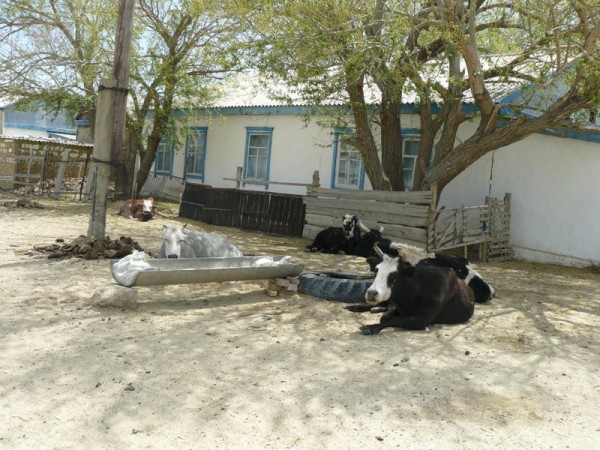
Road to Nowhere
Nobody in the minibus understood Russian except for the driver and a young woman sitting up front – hopefully I will get a chance to ask her a few questions when we arrive. Forty minutes later the minibus comes to a stop and the twelve passengers get out, but by the time I hoist my rucksack onto my back, they have all disappeared – where? I am left with the driver and he is in a hurry to go. How do I get back to Aralsk? Is there a café, a bar perhaps? No, no! But he will be going back to Aralsk at 14.00 hrs – that’s three hours from now – and to pass the time away, perhaps I would like to go to the cemetery up there… He’s gone in an instant.
I look around: not a living soul in sight, no animals; nothing moves; only sand under my feet and dwellings with few trees and shrubbery in between. The sun is already high up; the air is still, it’s hot although it’s only the second week of May …Three hours!
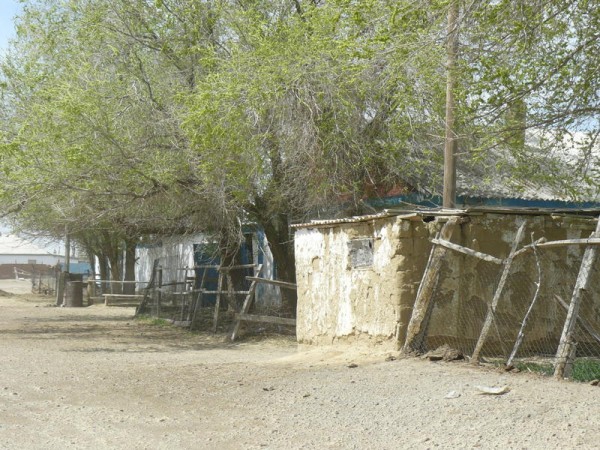 At Peace
At Peace
So I follow the desert track to the cemetery; it’s there, on raised ground about a kilometre away. Around me to the left and right there’s nothing except uneven desert terrain sparsely covered with grass. There, to my left, is a gap in the enclosure and, as I walk amongst the graves I am strangely aware that all worries have left me; I am at peace with myself and with the world – to whomever it belongs… The Muslim dead must be at peace too, they still have their little walled residence on this earth, some have a tomb or even a dome inside, others lie simply and peacefully below ground. They can look down towards their village; they can see their home and, in their own way, communicate with their dearest – they are with Allah.
I could spend a night here, at peace, without fear. And in a Christian cemetery? From early childhood to adulthood we fear ghosts, evil spirits, hell, purgatory – how difficult it is to get a place at our God’s table – for us, sinners.
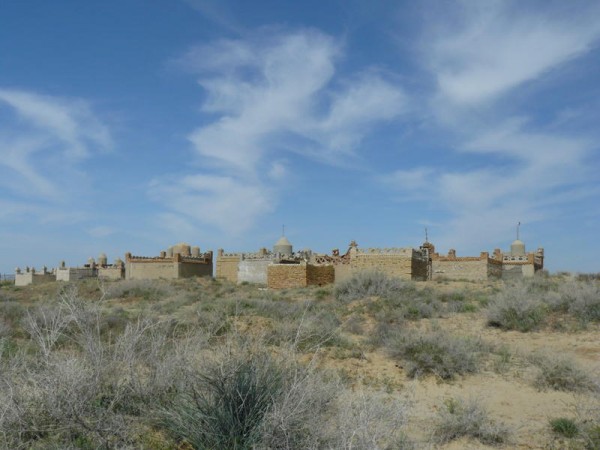
True to the Muslim tradition all graves are heading north-east so that the dead, when placed on their right shoulder, face south-west, towards Mecca. The long line of graves is only three deep and the wind has taken its toll: many of the timber enclosures have been knocked down, some completely destroyed, but even the more ambitious graves are crumbling through erosion and the effect of salt on mortar; sand is gradually encroaching on them all. But it’s quiet at the moment – “dead quiet” – and it would seem that nothing could live in this salt-laden sand, and yet, almost right under my foot a fragile little yellow flower, and just a step or two further, a solitary pale blue desert iris and, there again, a clump of withered grass and within it a family of delicate iris!
The ground behind the cemetery slopes towards a small salt-lake, its crust glistening white in the sun, and opens onto an infinite horizon. As I stand there mesmerized by infinity, a sudden gust of wind from the south-east blows in my face. The world around me changes instantly as the wind skims the surface of the dead-lake and blows a white cloud of fine salt streaming towards the cemetery.
Back in the cemetery, I take shelter behind one of the graves with a fine view of the village below. It’s peaceful and contemplative at the moment… silence, emptiness, my boots white from salt. And when it seems there is nothing but the dead for company here, a horse, somewhere to my right, neighs! Perhaps a live visitor is a rare event here for a moment later, a solitary small yellow butterfly flutters round my head and leaves; a fly settles on my knee but, evidently, my sweat, to which I am getting quite used to in this heat, is not to its taste for it also flies away… and I didn’t have the heart to swat this solitary sentinel of the cemetery.
A horse somewhere close by neighs again and suddenly there’s action in the village. Horses appear as if from under the sand and gather at the foot of a large lake by the village. Their numbers escalate; a horseman appears and, as one, they move towards the village. An amazing scenario – I am watching it with interest – but before I can focus my camera on the rider, the wind suddenly picks up and blows in strong gusts from behind the cemetery; a cloud of salt dust sweep over the cemetery towards the village and instantly the rider, the horses and the entire village is obliterated from my view! Vanished in a white cloud of salt!
The wind dies down, the salt cloud settles but the horses and the rider have gone – a mirage perhaps? Gusts of wind become more frequent and stronger. Horses knew, the rider knew what to expect in this desert at around noon in mid-May and horse-sense tells me too that it’s time for me to seek shelter in the village rather than here, amongst the dead.
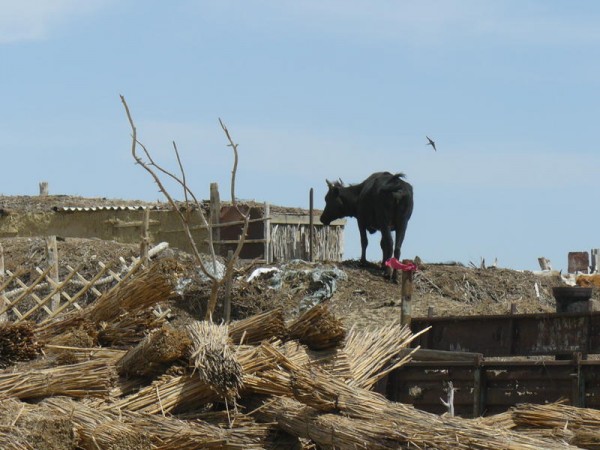 With my hat pulled down hard and fastened under my chin I make my way towards the village… somewhere there… in that direction… I can feel my windcheater stiffening from salt forced into its texture.
With my hat pulled down hard and fastened under my chin I make my way towards the village… somewhere there… in that direction… I can feel my windcheater stiffening from salt forced into its texture.
Kazakh Hospitality
The village is deserted and shrouded in murky air so I shelter from the wind and salt behind a wall of the first house I come across and resign myself to whiling away the remaining two hours sitting on some disused machinery. But I am not the only one with good “horse-sense” for on sand dunes to my right, three camels are racing towards the village; one in particular is anxious and soon leaves the other two behind in the race for shelter.
A young Kazakh man comes up to my perch and sits next to me – saying nothing. I try Russian on him but he doesn’t speak the language, so we sit like this for a little while, “incommunicado”, wondering who is who, or what.
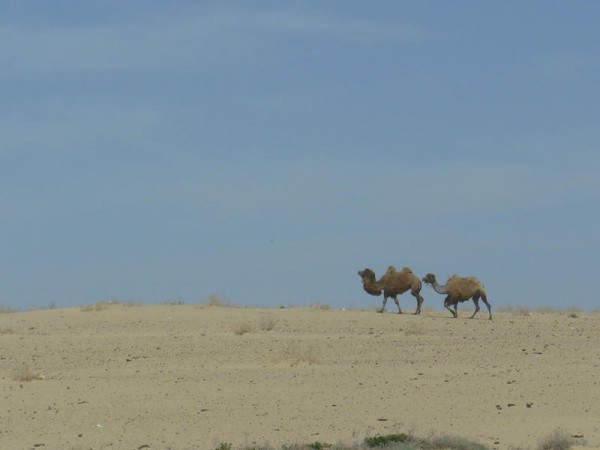
A little later a car pulls up to the entrance of the walled-in house and yard; my young man hops off our perch to talk to the driver who gives me a look of curiosity and, before I could ask him if, perhaps, he is going to Aralsk, he drives off. The young man disappears in the house and, a little later, reappears and beckons me in. Ah, Kazakh hospitality – how could they let a foreign visitor just sit on their doorstep! I am invited into the house to share their meal.
Happily, I remember to take off my boots and wash my hands in the bowl by the door, and we enter… The floor and walls are covered with colourful carpets and my hosts are reclining so low on the floor that they are almost not noticeable at first! The man lying on his back on the carpet by the table tries to raise himself a little – obviously very old, or sick – and an equally old woman is sitting cross-legged at one end of the table.
The table, covered with a white cloth, is not more than one foot off the floor; a large dish heaped with large-grain rice and meat stands in the centre and three large aluminium spoons are stuck in the rice; a variety of sweet morsels are heaped in a dish next to it. The young man takes one spoon, “demarcates” a portion of rice and gestures to me to eat. He can see that I don’t really know how to go about eating so he runs off and comes back with a small plate which he places in front of me.
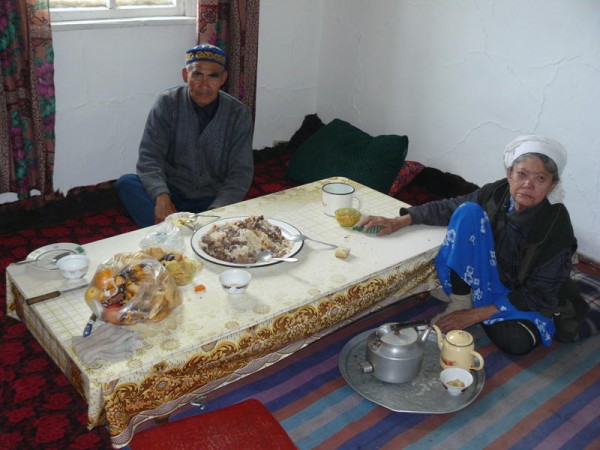 Meanwhile the old man raises himself onto one shoulder, takes one large spoonful of rice and meat, eats from it, then replaces the spoon in the rice on the common serving plate; the woman follows suit; the boy sits on a stool and attentively watches (me).
Meanwhile the old man raises himself onto one shoulder, takes one large spoonful of rice and meat, eats from it, then replaces the spoon in the rice on the common serving plate; the woman follows suit; the boy sits on a stool and attentively watches (me).
Changing Lives
What a wonderful opportunity to learn a little about their customs and their life. This old man may well remember the days back in the 1940’s when the Kazakhs were forced by the Soviets to abandon their nomadic ways for a life in kolkhoz; perhaps he could tell me about those tragic early years when his father and other Kazakhs in the community had slaughtered, in their own yards, all their cattle rather give it to the kolkhoz. Regrettably they don’t speak Russian – I don’t speak Kazakh. In sign language I tell the young man that I am seventy. How old is the old man? Seventy also; how old is he?Eighteen. So we can communicate.
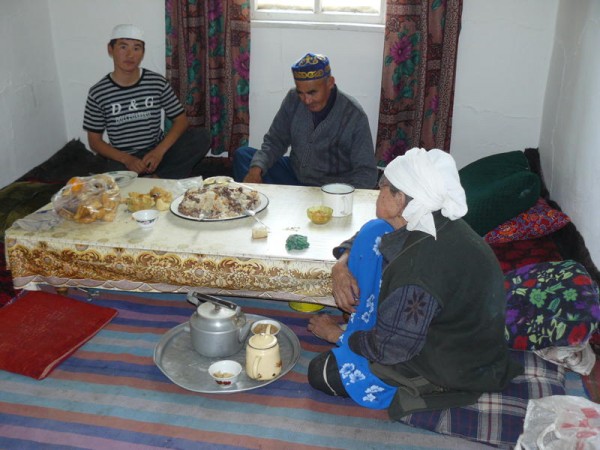
Before starting on the next chapter of our “conversation” I happen to glance at the clock on the wall and, with a shock, I see it is one hour ahead of my time – here in Aralsk, we are on Astana time! It’s time for me to run for the minibus to take me back to Aralsk! The boy nods with his head – yes it is! I thank my hosts as best I know – perhaps I could take a photograph of them? The old man, with great difficulty, raises himself to a sitting position and I can see a flicker of a proud and delighted smile on his face; the Kazakh woman sits upright, the boy joins them – a snapshot of Kazakh life.
We can see the black minibus in the distance; the boy waves to it – what a relief! The only obstacle is the camel sitting in the middle of our way and HE is not going to move for the likes of me and a “boy” and spits at me in disdain! And here’s another obstacle in our way – two men supporting a third man between them; red, happy, smiling, friendly faces, wobbly legs from early drinking… take our photograph too! A black cow stands motionless high up on a pile of timber and stares into the desert – has she lost a calf perhaps?
Three little boys, perhaps two-three years old, have just come out onto the road and settle down to play in the sand – our little boys play in sand pits, or in the sand on the beach by the sea; here they play in the sand on their own doorstep; will they ever see the Aral, or any sea? Two lean, big-horn cattle watch us sleepily from the shade under a tree…
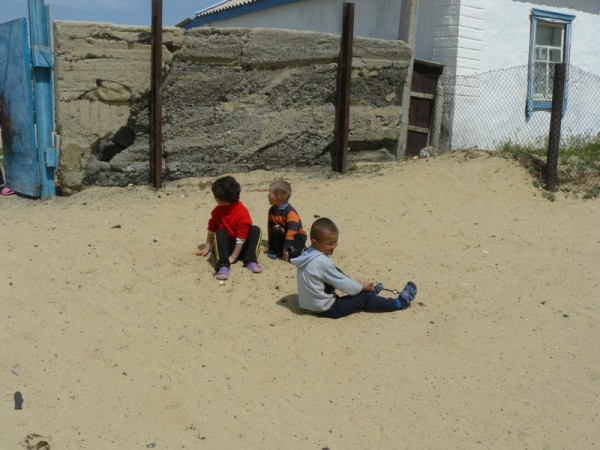
My minibus driver is trying to be helpful: all Kazakhs live in villages now, in houses like these. What do they do for a living? No, this is not a kolkhoz any longer; they have horses, cattle, sheep, camels… No, they don’t live in yurts any longer except when they take cattle way out to pasture, then they will put up yurts for themselves – but it’s too early in the year for that…
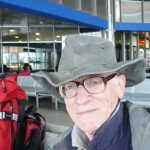 About the Author
About the Author
Jerry was born in Poland but grew up in and grew old in England. He says of his work with Our Roots Trust, “I am a fortunate man for, in between, I had a good life in the UK, the USA and France, but I lost my roots. So what shall I tell my children and their children? And so my search began in this big, beautiful and brutal world.”
How You Can Help
Visit the Our Roots Trust site to read more about the great work already being done and the projects planned for the future.
If you wish to make a small PayPal donation to Our Roots Trust please choose an amount and click the Donate button below. Even a small amount will be of great value to its recipients.
(In the interests of full disclosure, I should state that I am also a trustee of Our Roots Trust. Andy)
[donateplus]






Fantastic story! I was amazed at reading about these Kazakh people. This story just reiterated how kind many people are to foreigners. It also showed that simple stories and places like this are what traveling is all about – the people.